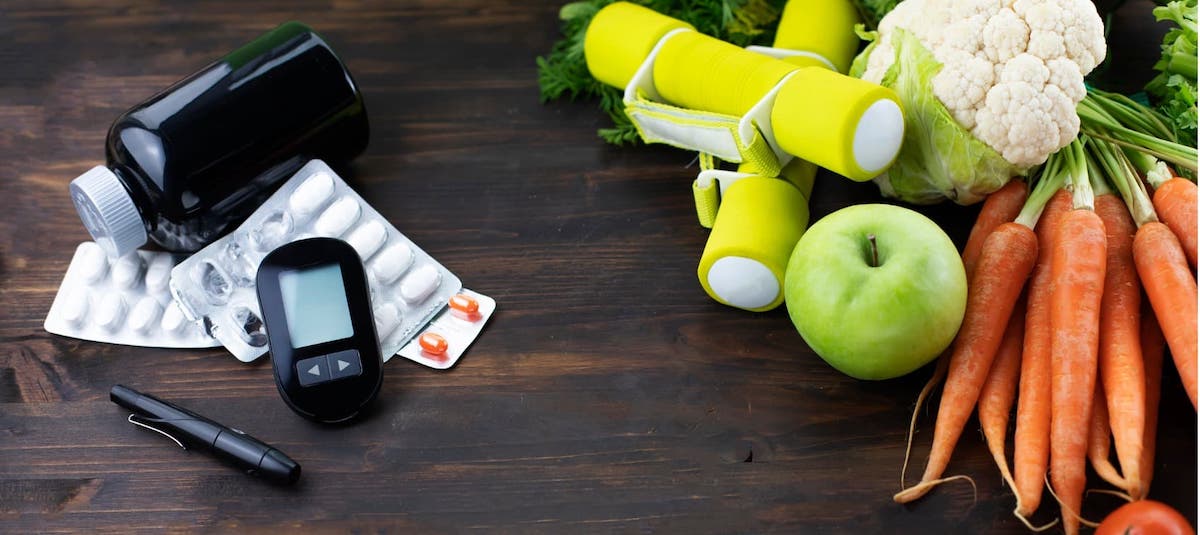
Glucose, also referred to as blood sugar, is the primary sugar found in the blood. This blood sugar travels through the bloodstream into the body’s cells, providing nutrients to the organs, muscles, and more. Most importantly, blood sugar is the main source of energy for the body.
The body gets glucose from the food we eat -- mainly from foods rich in carbohydrates. These foods can be breads, potatoes, and numerous types of other vegetables and fruits.
As the body digests the food, through various acids and enzymes, the carbohydrates are broken down into this usable form of sugar; glucose. It is absorbed and stored for energy use.
This breakdown process is carried out by the pancreas through a release of insulin -- a hormone created by beta cells.
In brief, the pancreas releases insulin into the bloodstream and to the body’s cells, allowing those cells to accept the glucose where they can then be converted to energy; to be used or stored. When this process is interrupted, problems arise.
Diabetes and Blood Sugar
According to the CDC, approximately 34 million people in the U.S. have diabetes, that’s 10.5% of the population. The numbers are rising for those who are considered to have prediabetes.
The insulin release has a direct impact on blood sugar levels within the body, when the process isn’t functioning normally, many health concerns can develop. Unfortunately, blood sugar problems are common in the U.S.
Diabetes is defined as a chronic disease characterized by an elevated level of glucose in the bloodstream — levels rise above normal and stay elevated. There are three main types:
- Prediabetes – This is a warning sign, when blood sugar levels are higher than normal, but not chronically.
- Type 1 – Also called juvenile or insulin-dependent diabetes, it is caused by the complete inability to make insulin, usually appearing before the age of 20.
- Type 2 – Occurring usually in adulthood, largely due to poor lifestyle habits (unhealthy diet, obesity, etc.), type 2 is defined as the body’s resistance to the effects of insulin or the inability to produce enough to maintain proper glucose levels.
Understanding Blood Sugar Levels
When the regulatory system or blood sugar levels are out of whack, health issues can spring up. These issues occur when blood sugar levels aren’t balanced within normal ranges.
Health problems can occur when blood sugar levels are too low and too high.
Low blood sugar
Low blood sugar, or hypoglycemia occurs when the body sugar in the body falls below a normal level or range. This can drastically affect energy levels.
It often occurs as a result of eating too many high carbohydrate foods, which are rich in glucose, causing a sudden surge in blood sugar levels, followed by a sudden drop — not a fun roller coaster.
It can also occur as a result of diabetes drugs that cause blood sugar levels to drop too low.
High blood sugar
Hyperglycemia, high blood sugar, refers to high levels of glucose in the blood. This occurs when the pancreas does not produce enough insulin to drive blood sugar levels down, or doesn’t produce insulin at all.
As noted, chronically elevated blood sugar is known as diabetes.
Type 2 diabetes is the most prevalent form of diabetes. However, the issue is usually not the pancreas’s inability to produce insulin, rather the insulin receptor sites inability to allow glucose to enter the necessary cells. This is known as insulin resistance.
Overtime, the beta cells in the pancreas can be overworked as it tries to release more and more insulin into the bloodstream to combat the high levels of glucose.
If left unchecked, this process of insulin production may eventually cease altogether.
A breakdown in the process puts people at risk for a host of health issues and serious complications such as vision problems, neuropathy, and kidney disease. Not to mention, people with type 2 diabetes are at higher risk for suffering from heart disease and strokes.
The 10 Best Supplements to Help Maintain Blood Sugar
There are options for lowering blood sugar levels that can help combat and manage diabetes. Of course, medications are one and they have their necessary place. Diet and exercise are another option that should always be strongly considered. However, there are also a host of nutritional supplements that can also help control blood sugar and help drive it down to healthier levels. Let’s take a look at the 10 best supplements to lower blood sugar.
1. Berberine
When considering nutritional supplements to help lower blood sugar, berberine should be near the top of the list. Berberine is a phytonutrient found in a variety of plants such as barberry — its use dates back centuries.
It is making a comeback due to its benefits regarding blood sugar health, but the berberine benefits don’t stop there.
In short, berberine targets AMP-activated protein kinase (AMPK), which helps regulate metabolism by stimulating the uptake of glucose in the body’s cells, improving insulin sensitivity in the process.
This is good news for those looking to drive blood sugar levels down due to poor insulin performance.
Typical dosing: 1,500 mg daily, usually in divided doses.
2. Chromium
Chromium is another helpful ally in the fight to lower blood sugar.
Chromium is considered a trace mineral, it is found in many places, from potato skins to oysters. It is an essential mineral for fat metabolism but also has advantages for maintaining healthy blood sugar levels.
Chromium binds to insulin receptors and enhances insulin activity. This process works to increase the number of insulin receptors while improving the sensitivity of beta cells necessary for insulin performance within the pancreas.
Basically, it helps move the stubborn glucose into the cells, thus lowering blood sugar levels.
Typical dosing: 200 to 500 mcg daily
3. Magnesium
Magnesium is another helpful mineral that makes the list. It is typically known as a mineral that is vital for carbohydrate metabolism, energy production, synthesizing of certain proteins, and cell replication.
However, it has also shown promise for its ability to decrease insulin resistance, which doesn’t allow glucose to be pushed into the cells.
Magnesium levels are typically lower in people with diabetes, due to the excessive urination that is usually associated with diabetes; magnesium literally gets washed out.
Studies have found that magnesium, in addition to reducing oxidative stress caused by free radicals, is involved in the glucose transfer process as it is carried across cell membranes, which aids glucose control by improving insulin sensitivity.
Typical dosing: 500 to 1000 mg daily
4. Vitamin D Deficiency
Studies have shown that Vitamin D deficiency is considered a risk factor for type 2 diabetes. Low Vitamin D levels can affect blood sugar metabolism. A decrease in insulin production and insulin resistance in the cells are just a few of the issues that can result from Vitamin D deficiencies.
Typically, Vitamin D is better known for its role in calcium absorption, however, its benefits towards blood sugar metabolism is worthy of mention. For one, it may improve the function of pancreatic cells that make insulin. Furthermore, it helps improve overall insulin sensitivity and insulin production. These benefits are suppressed when Vitamin D levels are low.
Typical dosing: At least 2,000 IU daily
5. Vitamin C
Another helpful vitamin is Vitamin C. Most people are already familiar with its many uses in immune-support, helping to keep colds and flu at bay.
However, its benefits reach far beyond the common cold and flu aid. Its role in the battle against oxidative stress cannot be overstated. High blood sugar increases the prevalence of free radicals in the body. Excess oxidative stress can have a major impact on insulin resistance.
Vitamin C helps protect the body from oxidative stress, in turn helping to reduce diabetic complications. It has also shown an ability to help control blood sugar levels.
In one study, participants who took 500 mg of Vitamin C twice a day for four months showed better glucose control as compared to the placebo group.
Typical dosing: At least 1,000 mg daily
6. Vitamin E
A third vitamin making the list for supplements to help lower blood sugar is Vitamin E. Vitamin E is considered a fat-soluble antioxidant; helping to protect lipids, or fats, against the damages wrought by oxidative stress. In short, Vitamin E helps disrupt the cell's reaction to free radicals, protecting cell membrane integrity.
Much like Vitamin C, Vitamin E helps support healthy blood sugar levels by protecting cells from oxidative stress damage, which can increase into those with diabetes.
Typical dosing: At least 200 IU daily
7. Vanadyl Sulfate
Vanadyl sulfate is a form of a trace mineral known as vanadium, which is normally found in foods such as mushrooms. Remarkably, vanadyl sulfate carries an insulin-like effect, mimicking its role in the body.
Many research studies have shown its benefits in helping to manage diabetes and blood sugar levels. Participants given 100 mg of vanadyl sulfate daily for four weeks saw a 20 percent reduction in average fasting blood sugar levels.
By its ability to mimic insulin, vanadyl sulfate is able to assist in the transport of glucose in the body’s cells, which in turn helps lower blood sugar levels and insulin sensitivity.
Typical dosing: 100 mg daily
8. Gymnema Sylvestre
Gymnema is an herb extract taken from the leaves of plants native to part of India.
In Hindu it’s referred to as gurmar — the “sugar destroyer.” The name certainly applies, it has proven a formidable ally in reducing blood sugar.
In brief, the plant contains gymnemic acids, which have shown an ability to slow glucose transport from the intestines to the bloodstream — helping maintain healthy blood sugar levels.
A study of its effects took participants with type 2 diabetes, and on medications, and gave them 400 mg of gymnema extract daily for 18 months.
Participants showed a significant reduction in blood sugar levels, even allowing some to reduce their medication dosages; a few others were able to maintain healthy levels on gymnema alone.
Typical dosing: 400 mg daily
9. Cinnamon
Yes, you read that correctly — cinnamon.. One helpful benefit of cinnamon is its ability to dilate blood vessels by stimulating the release of nitric oxide.
This process enhances overall circulation. Increased circulation allows the body to metabolize glucose quicker. This aids blood sugar control by increasing glucose metabolism. Furthermore, due to its effects, cinnamon can also help promote the absorption of berberine.
Typical dosing: As a supplement — found in combination — 1,000 mg daily
10. Purslane
Purslane (portulaca oleracea) is a popular plant, well, at least to those who love to eat it. Many others consider it to be nothing more than a weed, rather than a botanical wonder. But, it has proven to be a wonder weed for those trying to lower their blood sugar naturally.
Its patented extract has been shown to increase insulin sensitivity by enhancing the uptake of glucose into the body’s cells. Furthermore, it has been shown to slow the transport of glucose into the blood from the intestines, helping to maintain healthy blood sugar levels.
Typical dosing: 180 mg daily in extract form found in combination.
In Conclusion
Maintaining healthy blood sugar levels is extremely important for overall health and wellness. When blood sugar levels are out of whack, dangerous health issues can arise.
Diabetes is typically brought about when blood sugar levels are chronically high. Sometimes, doctor prescribed medication is needed, but diet and exercise should always be part of the routine to maintain blood sugar levels.
Natural supplements should also be considered.
Numerous natural supplements, usually found in combination with one another, can have a great impact on overall health by lowering and maintaining blood sugar levels. Those listed above are more than worthy of consideration.


